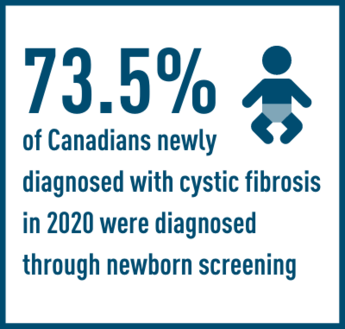Growing evidence of Trikafta’s benefit
November 21, 2024: Evidence continues to mount about the positive impact of Trikafta in Canada, with the Canadian Institute for Health Information (CIHI) today publishing an analysis of the cystic fibrosis therapy’s impact on the health-care system.
CIHI’s analysis supports the data we have been publishing in our Canadian Cystic Fibrosis Registry annual data report, and what we have been hearing from the community: Trikafta is significantly improving the health of many Canadians with cystic fibrosis.
CIHI’s analysis looked at people who started taking Trikafta between June 2021 and March 2022. Its key findings are:
- The biggest impact of Trikafta for people with CF was a decrease in need for acute care (brief but severe episode of illness)
- Routine care saw less immediate change with Trikafta use
- There is inequity in access to Trikafta across Canada
The timeframe of CIHI’s assessment examines a time when Canadians had limited access to Trikafta and looked at people aged 12 and older with at least one F508del gene mutation, the most common mutation linked to CF. Since then, Trikafta approval has been expanded to include people aged 2 to 11 with at least one F508del gene mutation, and more recently for Canadians who have one of 152 rarer genetic mutations identified by Health Canada. This suggests that the positive impact of Trikafta could be even greater as more people gained access to it.
Our current advocacy efforts focus on broader access to Trikafta. Our message is simple: everyone who could benefit from Trikafta should have the opportunity to try it, and public/private funders should allow for this in their reimbursement decisions. There are as many as 180 people in Canada for whom the benefits of Trikafta remain unknown and who are at risk of being left behind.
At the same time, we recognize Trikafta is not a cure, and its long-term effects are unclear. Many people with cystic fibrosis continue to face severe health challenges despite being on Trikafta, including ongoing complications resulting from lifelong damage to their bodies before accessing the drug. There are others who are unable to tolerate Trikafta or for whom the medication will not work. Additionally, some individuals have undergone lung transplants to address their airway issues, but other CF related complications persist, and they currently remain excluded from accessing Trikafta. The way in which Canada’s cystic fibrosis community receives care is becoming more diverse and requires new approaches to ensure the right care at the right time, so everyone in Canada with cystic fibrosis can achieve a long, full and healthy life.
The affordability of Trikafta remains uneven across Canada, with the CIHI data showing that financial barriers are directly impacting access to this life-saving drug. This lack of affordability in Canada is unacceptable in 2024. Cystic Fibrosis Canada is relentless in its advocacy efforts to secure access to Trikafta for all who may benefit, and to eliminate the financial barriers preventing the cystic fibrosis community from accessing the medication they need.
Cystic Fibrosis Canada participated in the Expert Advisory Group which guided this work. Through our community input program Elevate, we invited the Canadian cystic fibrosis community to participate in interviews with CIHI about their personal experience with Trikafta.
Read CIHI’s analysis: Impact of Trikafta on individuals living with cystic fibrosis | CIHI




